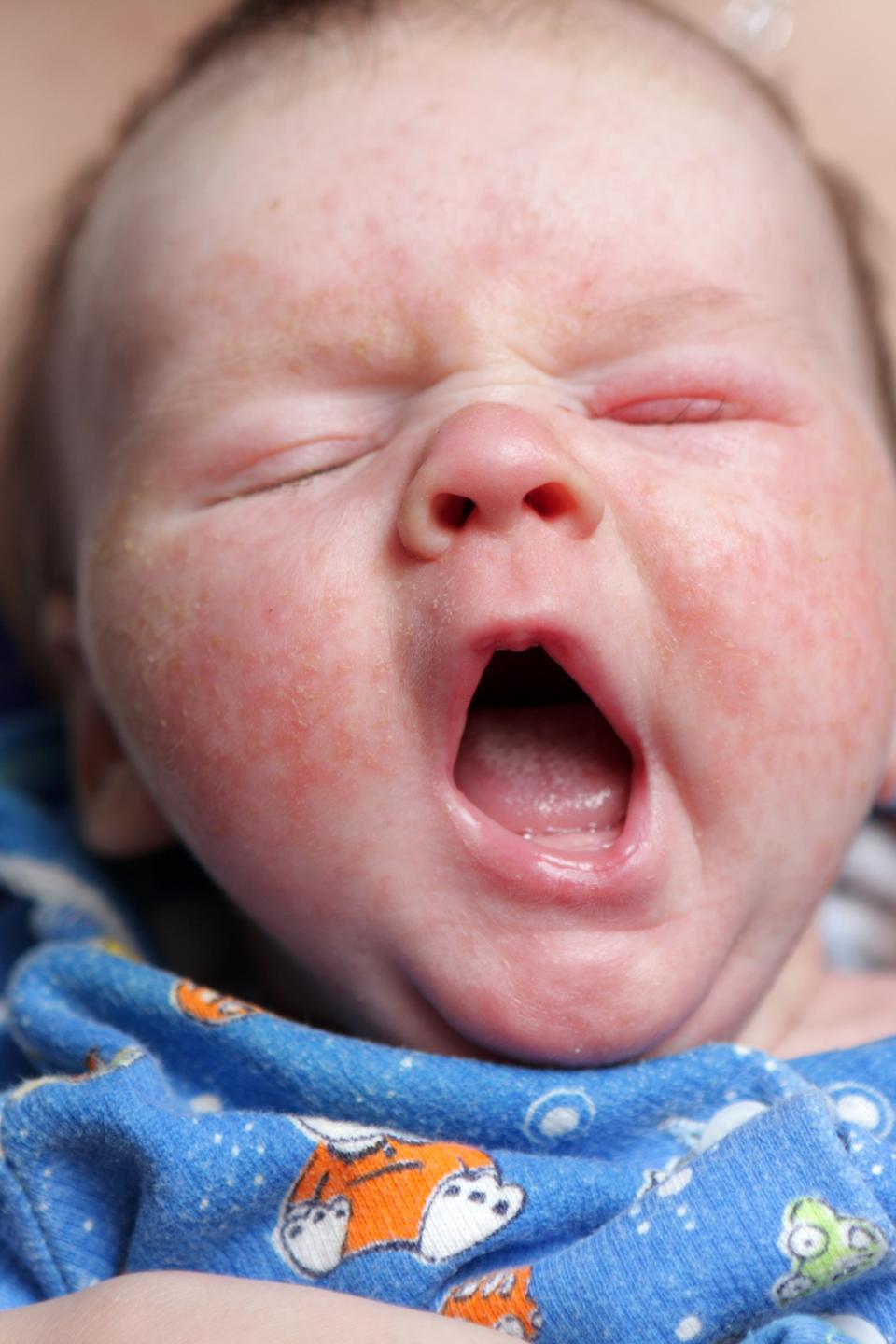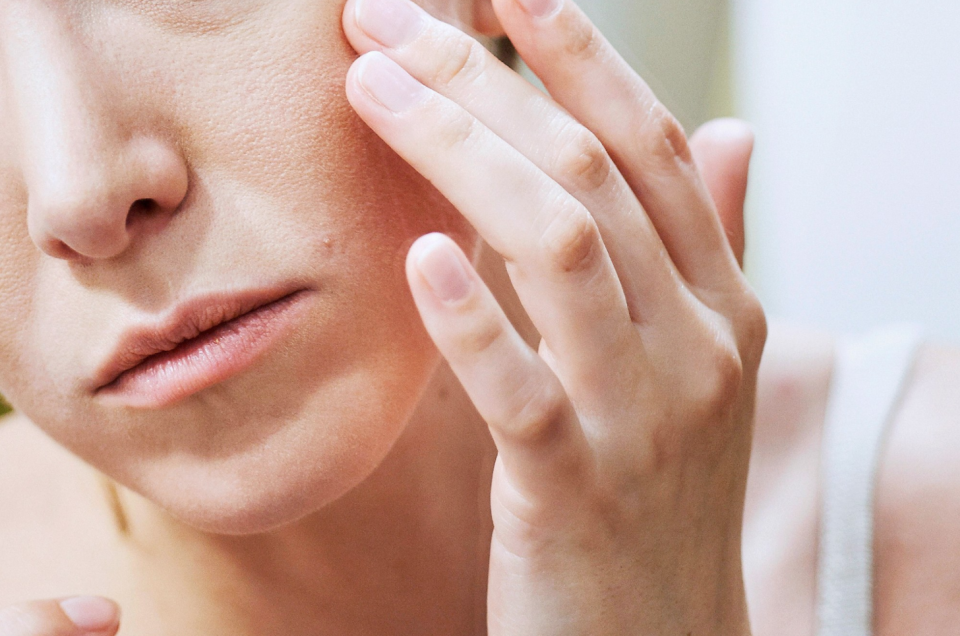How to Treat Facial Eczema, According to Dermatologists
It goes without saying that atopic dermatitis, aka eczema, isn't fun in any form. But, when a skin condition characterized by red, itchy blisters appears on your face, of all places, it makes it all the more frustrating and impossible to ignore.
While there is no study evaluating the prevalence of facial eczema, specifically, New York City-based dermatologist, Neil Sadick, says he believes the disorder affects about a third of the population. Much like acne, having eczema on the face is painful and can be a major confidence killer, as we've been conditioned to believe skin imperfections are something we should have to hide and feel ashamed of (FYI: not true).
Nevertheless, anyone battling facial eczema knows first-hand how uncomfortable and emotionally exhausting it can be. Good news, though: You're not alone, and there are solutions, as well as ways to keep it under control. We spoke with several board-certified dermatologists to find out what exactly constitutes facial eczema, what triggers the condition, and most importantly, how to keep symptoms at bay.
How do I know if I have facial eczema?
Believe it or not, one of the most cumbersome aspects of facial eczema is figuring out whether you actually have eczema. Your dry or irritated skin could be the result of a bad reaction to a product you're using, harsh weather, and other common factors that can impact skin health.
"It can be difficult to distinguish the two as skin affected by eczema is dry and irritated, [but] generally, dry skin is not irritated and itchy to the level of eczema and will readily respond to moisturizers, gentle skin care, and bringing humidity back to the environment," explains Sejal Shah, a New York City-based dermatologist. Sadick adds that unlike the mild flaking, dullness, and tightness associated with dry skin, facial eczema generally involves intense itchiness, cracked skin, and even bleeding. All this to say: If you're still stumped, or just want a second opinion, go see your dermatologist to find out for sure.
What causes it?
Eczema actually refers to a group of conditions that cause the skin to become red, itchy, scaly, and inflamed, says Shah. There are several types, too. Atopic dermatitis, a form that often appears in adolescence and is more prevalent among those with a family history of the condition, is the most common type.
"Often when people say 'eczema,' this is the condition they are referring to [and] atopic dermatitis can affect the face," explains Shah. That being said, contact dermatitis can also affect the face and Shah says there are a myriad of things that can induce flare-ups, including cold weather, hot water, food sensitivities, sun, sweat, stress (the list goes on and on).
One thing she notes, however, is that not all people with eczema have the same triggers. So while one fragranced product may elicit a reaction in one person, it's entirely possible it won't in another. This is why it's important to see your doctor in order to determine if what you have is, in fact, actually eczema, and if so, figure out the underlying cause (if it wasn't inherited). For instance, Sadick says some people develop facial eczema after having an allergic reaction to eggs, peanuts, and/or shellfish. So, if allergies tend to run in your family, that's definitely something to be wary of.

baby with facial eczema
Should I treat facial eczema differently than I would eczema on my body?
Short answer? Yes. Both Sadick and Shah recommend using milder products (especially when it comes to steroids) on your face, as the skin is thinner and more sensitive than the skin on your body. "I would use eczema skin-care products designed for face and body respectively as they contain different concentrations of active ingredients," says Sadick.
Adam Friedman, an associate professor of dermatology at George Washington School of Medicine and Health Sciences in Washington, D.C., recommends using weaker topical steroids or steroid-sparing ingredients, like pimecrolimus, tacrolimus, and crisaborol, as he says "the facial skin is more sensitive to the skin thinning and lightening effect of topical steroids."
OK, but what over-the-counter products can I use?
Although it may be uncomfortable to live with a skin condition like eczema, thankfully, we live in a time where brands have begun to cater to the needs of people with a wide range of skin ailments. For example, Sadick recommends the eczema therapy lines from Aveeno, Eucerin, and CeraVe.
Shah also recommends Eau Thermale Avène's Cicalfate Restorative Skin Cream, which contains healing zinc oxide and skin barrier-protecting beeswax. As far as cleansers go, Shah says she likes Vanicream's Gentle Facial Cleanser and La Roche-Posay's Toleriane Dermo-Cleanser, both of which are gentle on the skin.
What should I do if over-the-counter products aren't cutting it?
Sadly, sometimes eczema on the face can prove extremely stubborn to the point where treatment may need to be prescribed by a doctor. "If home treatments are not helping, you may need prescription medications," says Shah. "I usually prescribe either a topical steroid or a topical calcineurin inhibitor, a non-steroidal medication that can reduce inflammation and treat eczema."
Shah says she sometimes prescribes specialized moisturizers, called barrier repair creams, to patients. And, if the eczema is very severe and not responding to topical treatments, other options include phototherapy, (aka light therapy). There's a wide range of treatment options out there for facial eczema, so it ultimately comes down to trial and error, in order to figure out what works best for you. That said, we'd recommend always consulting your dermatologist before trying anything new.
Now read more about eczema:
Now, see this year's Best of Beauty winners for sensitive skin:


